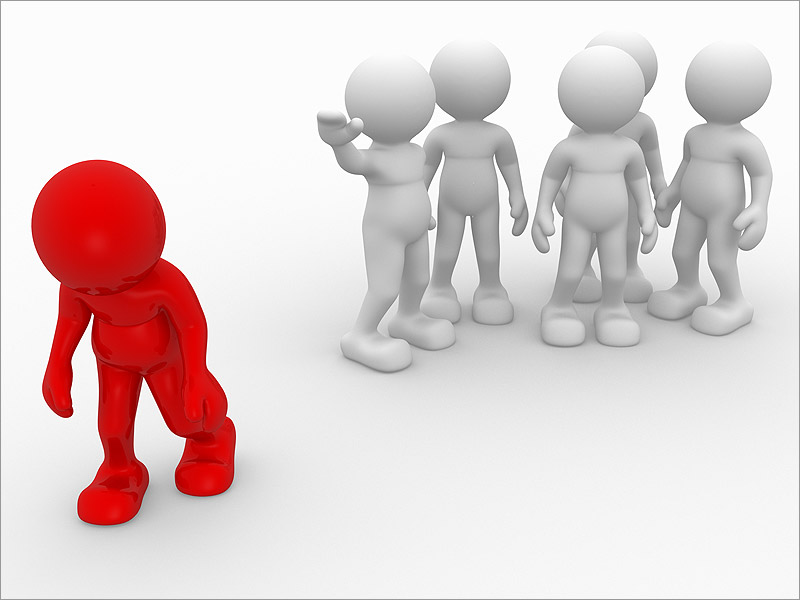What does prejudice spring from? Scientists who have tried to tackle the question have been able to link it to our evolutionary past.
Prejudice is puzzling in some ways because it appears to go against the basic principles that guide natural selection within our species. After all, if diverse traits serve to strengthen the human race, we should be instinctively drawn to diversity. We would seek it out actively – in our partners and within the social circles that form around us. And yet human history is mired in examples of prejudice and bigotry – of people shunning others who are unlike them and of dominant groups edging out ones they view as being different or inferior in some way.
Scientists who have been trying to crack this puzzle now have some answers. In 2011, a team of Yale researchers conducted a series of experiments on rhesus monkeys, a species that is similar to humans in the way its members band together and form social connections.
The researchers exposed the subjects to photographs of ‘outsider’ and ‘insider’ monkeys and then tried to gauge their reactions to these. They also ran a simian version of a test used to detect unconscious biases in humans. The results support the hypothesis that prejudice can be traced to our evolutionary past – to a time when our ancestors huddled and moved in groups in order to ward off external threats.
The Yale study, although widely cited after its publication, has since been retracted due to inadvertent coding errors that may have compromised the results. However, other psychologists have also delved into the origins of prejudice and arrived at similar conclusions.
Steven Neuberg, a professor of social psychology at the University of Arizona believes that prejudice has evolved from a type of ‘tribal psychology’ of yore. This resulted in anybody who came in from outside being perceived as an invader who could potentially harm the group or rob it of precious resources.
Even those of us who think of ourselves as open-minded are not completely so. If we were to undergo the test for bias described earlier, we may uncover many unexpressed reservations about entire groups of people – the religious, the overweight, the uneducated, and more.
This tendency is partly driven by our need for labeling and categorization. Coke’s recent Ramadan ad effectively illustrates how our inclination for snap judgments lies just below the surface. The ad shows a group of strangers seated in a dark room, with each taking turns talking about himself and his interests. When the lights go on at the end, everyone is surprised at the physical appearance of the others at the table as these do not fit the impressions they had formed based on voice and verbal cues.
The problems really begin when our innate biases start manifesting themselves in the form of open discrimination. Many books and movies have explored this theme, with their protagonists taking on sexism, racism, casteism and other forms of ‘isms’. The best ones continue to resonate years after they were first released.
A good example is the Harper Lee classic, ‘To Kill a Mockingbird’, a story arranged around the darkness of racial inequality in Depression era America and the idealism of Atticus Finch, an attorney who risks physical danger by defending a black man in a criminal case. Ever since the book was published in 1960, Finch has been the literary world’s best example of racial heroism.
And now suddenly there is a new picture of Finch that has emerged with the publication of Lee’s sequel, ‘Go Set a Watchman’. This is the version that the author penned before her editor suggested a change in storytelling strategy. The new book portrays Finch as aging, arthritic and – in a shocking shift in characterization – as a bigot with decidedly racist views.
For those who love the original book and for others who have watched the movie starring Gregory Peck, it has been unsettling to see this side of Finch. On social media, one of them compared it to finding out that “Santa Claus beats his reindeer”.
Finch is a product of one author’s imaginative mind and it may be futile to agonize over his change in ideology. What we can take away from this is that even the most open-minded of us could lapse into bigoted ways of thinking. Given our genetic predisposition, a single experience or a set of them could quickly move our views from moderate to extreme.
Of course, prejudice has no place or value in a modern society that is predicated on acceptance, tolerance and diversity. Experts have floated the ‘Contact Hypothesis’ – based on meaningful and valuable interaction with members of other groups – as a way to move away from it.
But first, we have to acknowledge that we are hardwired for prejudice in a manner that is not entirely dictated by environment. We could stop pointing to history, social circumstances, religion and more in trying to understand the roots of human prejudice. Instead, we could start by looking more closely at where it all begins – in our minds.
References:
- Grewal, Daisy. “The Evolution of Prejudice” http://www.scientificamerican.com/article/evolution-of-prejudice/
- Arizona State University. “Prejudice Is Hard-wired Into The Human Brain, Says ASU Study.” ScienceDaily, 25 May 2005. www.sciencedaily.com/releases/2005/05/050525105357.htm
- Sarda-Joshi, Guari. “Social Psychology – Understanding Prejudice” http://futurehumanevolution.com/understanding-prejudice




